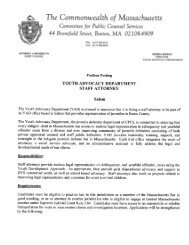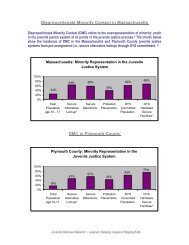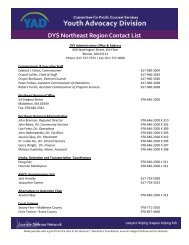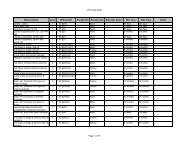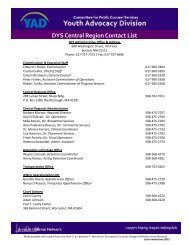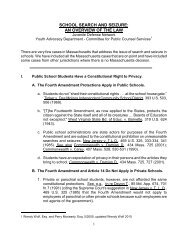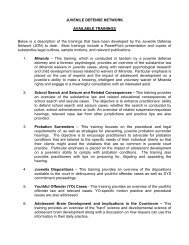States rethink 'adult time for adult crime' - the Youth Advocacy Division
States rethink 'adult time for adult crime' - the Youth Advocacy Division
States rethink 'adult time for adult crime' - the Youth Advocacy Division
Create successful ePaper yourself
Turn your PDF publications into a flip-book with our unique Google optimized e-Paper software.
New research shows stark differences in teen brains<br />
imaging studies that first detected <strong>the</strong> middle school growth spurt, said <strong>the</strong> new<br />
understanding of teen brains "argues <strong>for</strong> doing a lot of things as a teenager. You are<br />
hard-wiring you brain in adolescence. Do you want to hard-wire it <strong>for</strong> sports and<br />
playing music and doing ma<strong>the</strong>matics, or <strong>for</strong> lying on <strong>the</strong> couch in front of <strong>the</strong><br />
television"<br />
The new understanding of adolescent brains leads to questions of ethics and<br />
legalities.<br />
The Supreme Court already has decided that people should not be executed <strong>for</strong><br />
crimes committed when <strong>the</strong>y were age 15 or younger, and in <strong>the</strong> fall is scheduled to<br />
consider whe<strong>the</strong>r <strong>the</strong> restriction should be extended to everyone under 18.<br />
Two years ago, <strong>the</strong> court banned execution of mentally retarded people because of<br />
deficiencies that "diminish <strong>the</strong>ir personal culpability."<br />
"With <strong>the</strong> new biological explanation that adolescent brains are different, we think<br />
<strong>the</strong>re's scientific evidence that <strong>the</strong>y, too, are less culpable," said Stephen Harper, an<br />
adjunct professor of juvenile justice at <strong>the</strong> University of Miami School of Law who<br />
specializes in capital cases.<br />
Gur said some scientists would put off <strong>the</strong> age of legal majority to 22 or 23, and said<br />
<strong>the</strong>re will likely be considerable debate over how to tell when a person's brain<br />
physically looks like an <strong>adult</strong>'s as imaging research continues and ef<strong>for</strong>ts to set<br />
standards and norms develop.<br />
Fassler predicts that within a decade, brain images will be sophisticated enough to<br />
"help us determine <strong>the</strong> age <strong>for</strong> appropriate treatment of addictions and <strong>the</strong>rapy<br />
models <strong>for</strong> <strong>adult</strong>s and adolescents with disorders."<br />
O<strong>the</strong>r researchers say that while it's possible to gain general understanding about<br />
brain development and function from <strong>the</strong> images, <strong>the</strong> notion that medicine, law<br />
en<strong>for</strong>cement or anyone else should work from some ideal, normal brain model is<br />
troubling.<br />
"Each individual is not an exact map, and <strong>the</strong> difficulties in determining what <strong>the</strong><br />
range of variations are is really dangerous. The data is incredibly easy to be overinterpreted,"<br />
said Sonia Miller, a New York attorney who specializes in cases dealing<br />
with new technologies.<br />
Some courts are already accepting brain scans as evidence of a person's mental<br />
capacity in criminal cases, she said, and "as <strong>the</strong> neuroscience of intentional behavior<br />
develops, <strong>the</strong> way we assign responsibility and blame will be challenged. This raises<br />
a lot of questions about how much neural privacy can we expect, how much <strong>the</strong><br />
authorities can get into your brain."<br />
Dr. Peter Bandettini, a brain-imaging researcher at <strong>the</strong> National Institutes of Health,<br />
said <strong>the</strong> science of understanding what small structures and chemicals are doing<br />
within <strong>the</strong> brain is far from a gold standard <strong>for</strong> mental function or age.<br />
"Right now, I personally think you'd get more in<strong>for</strong>mation about a person's mental<br />
age by going to a set of behavioral tests. But I'd agree that as <strong>the</strong>se technologies<br />
become more powerful, <strong>the</strong>re's going to be a greater need <strong>for</strong> checks and balances<br />
to determine how <strong>the</strong> imaging in<strong>for</strong>mation should be used."<br />
On <strong>the</strong> Net:<br />
●<br />
●<br />
●<br />
●<br />
http://www.nimh.nih.gov/<br />
http://www.dana.org/<br />
http://www.aap.org/<br />
http://www.psych.org/<br />
file:///L|/JDN/Brain%20Resources/Brain%20Development/...0shows%20stark%20differences%20in%20teen%20brains.htm (3 of 4)8/16/2006 4:42:07 PM





